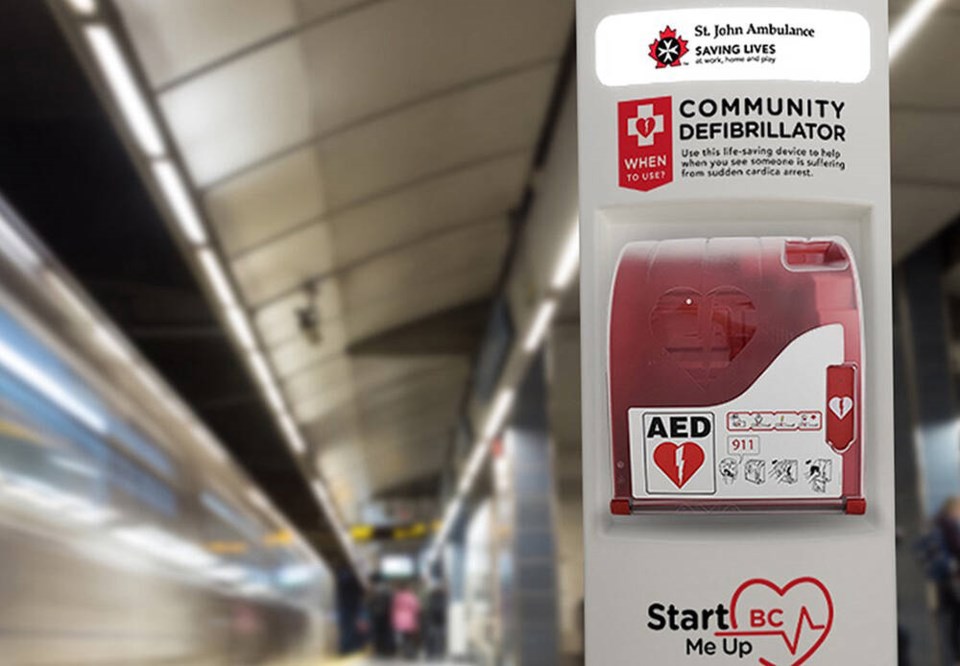BC United MLA Shirley Bond, Shadow Minister for Health, last week re-introduced her proposed Defibrillator Public Access Act, legislation she says is designed to help save lives.
The Defibrillator Public Access Act would require every public building in B.C. to have an automated external defibrillator (AED) that is visible, registered and maintained.
Noting that in 2021, approximately 8,300 people in B.C. experienced a sudden cardiac arrest, which can happen to anyone, anywhere at any time, Bond said every minute counts.
CPR and the use of an AED can make the likelihood of surviving a sudden cardiac arrest double, she said.
The AEDs would be registered with BC Emergency Health Services and linked to the ambulance dispatch information system, so that dispatchers can direct callers to the nearest AED.
Last month, the City of Delta, in a partnership with St. John Ambulance, installed publicly accessible AED stands at four city parks. The stands include an AED unit and a first aid kit for bystanders to use when someone is experiencing cardiac arrest.
“Considering most cardiac arrests happen away from hospitals, these stands provide essential tools to the public in the event someone experiences a major medical emergency,” the city explained in a news release.
Representatives from St. John Ambulance last year made a presentation to council during a province-wide Start Me Up campaign. The goal of the campaign is to partner with cities throughout the province to place 1,000 publicly accessible AEDs across BC. Public spaces targeted for AEDs include transit corridors, SkyTrain stations, bus loops and high traffic areas like shopping malls, parks and other key locations.
Ken Leggatt, Chief Operating Office for St. John Ambulance, told council that, unlike heart attacks, sudden cardiac arrests can happen at any time, and can lead to unconsciousness and can be fatal if not treated immediately with CPR and an AED.
The St. John Ambulance’s campaign includes an educational component aimed at teaching people how to use AEDs.
The City of Delta already had AED units in each of its major recreation facilities, while publicly-accessible units are also at the Tsawwassen Arts Centre, North Delta Centre for the Arts, Ladner Community Centre, Pinewood Leisure Centre and at the Harris Barn and Kirkland House.
The city until this March did not have AEDs installed in outdoor facilities such as park fieldhouses.
A staff report when the decision was made to install the new units at select parks noted the city’s approach would provide staff with an opportunity to assess any complications or issues that may need to be considered before installing any additional units.
“Given the benefit of AEDs, staff also plan to explore the placement of units inside each of the City’s park fieldhouses as well as at each of the City’s public libraries. Recognizing that AEDs are most useful when a user has some training on the devices and/or CPR, staff also recommend that facility user groups in locations where the City has AED units, but no staff regularly on site, receive training on CPR and the use of AEDs,” the report notes.
The report also notes that as far as concerns from the public about liability, a chapter under the British Columbia Good Samaritan Act indicates that individuals who render emergency medical support at the scene of an accident or emergency cannot be held liable for any injury caused or death.
The locations of the new Delta AED stands are:
North Delta Community Park – 11311 84th Ave.
John Oliver Park – 11590 Ladner Trunk Rd.
Holly Park – 4681 62nd St.
Fred Gingell Park – 253 English Bluff Rd.




